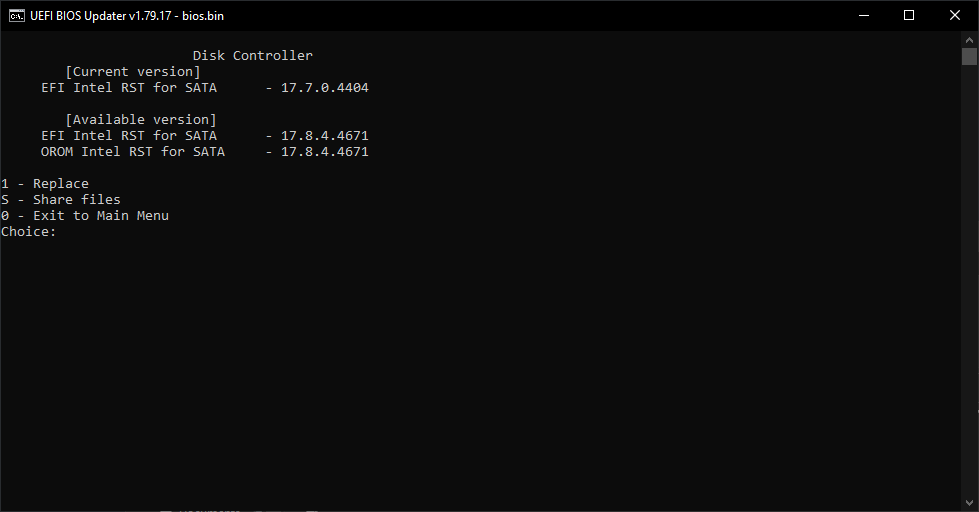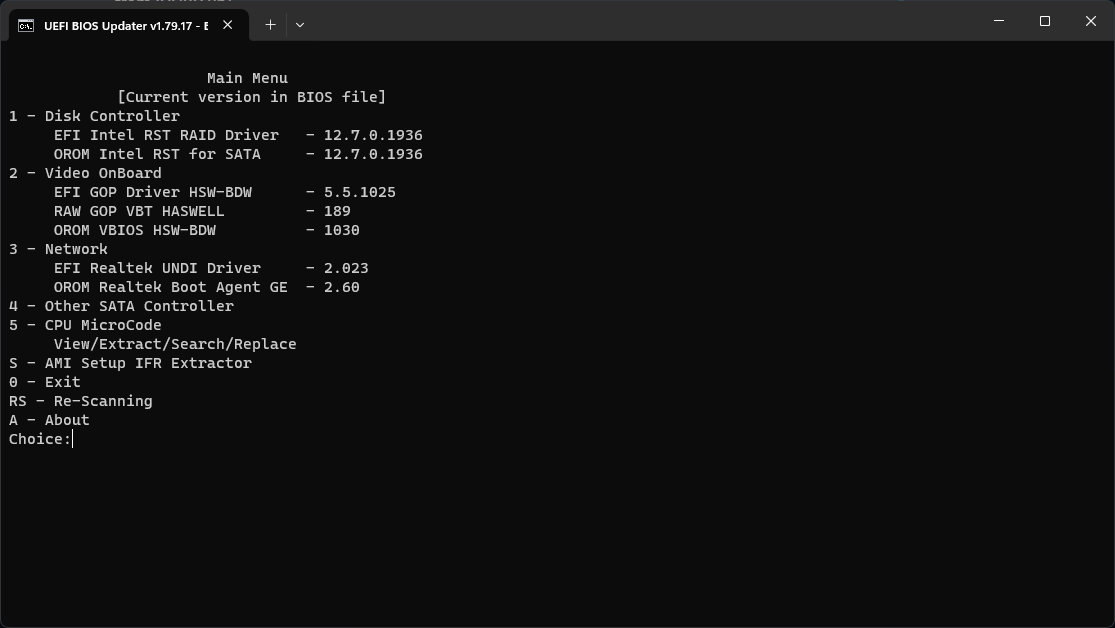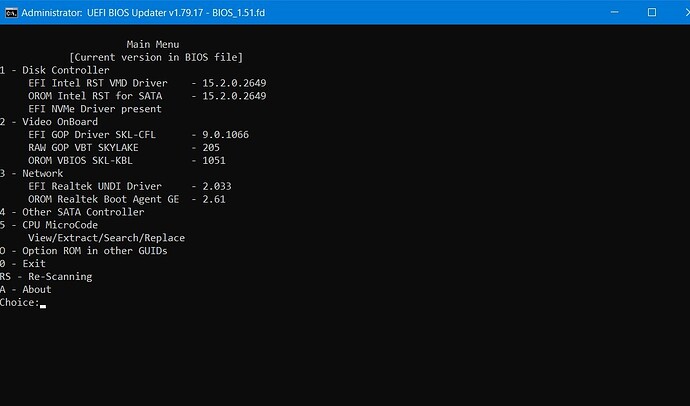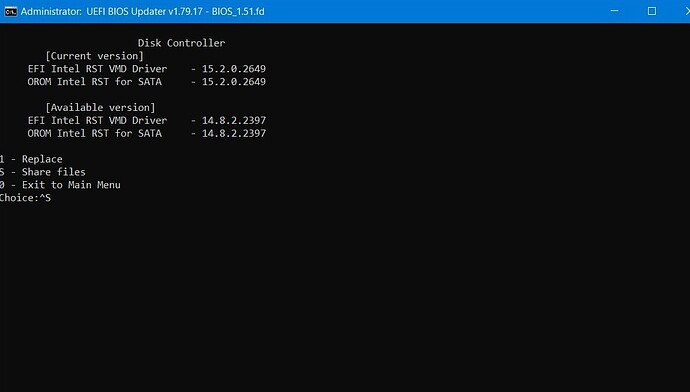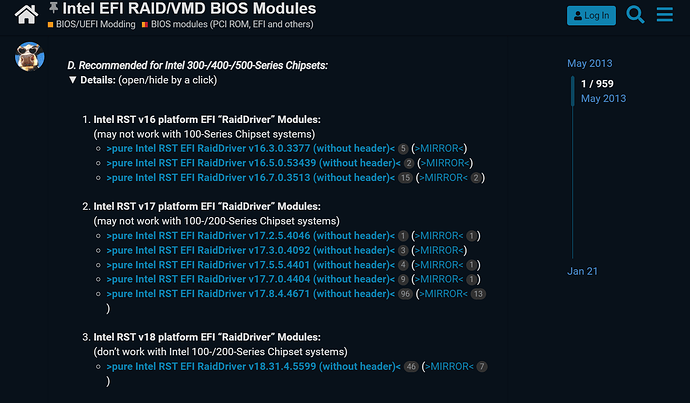OROM option is missing. Safe to proceed? How about v18.31 of RaidDriver? HM370 chipset, InsydeH20
Thanks
@admanny
Why do you want to update the Intel RAID BIOS modules at all? They are only used, if your on-board Intel SATA Controller is running in RAID mode and you have created an Intel RST RAID array. The recommended Intel RST RAID module platform version (v17 or v18) depends on the Intel RST RAID driver version.
Second question: Which Intel RST RAID driver are you currently using?
It is safe to proceed, but your system will not use the Option ROM module, because the OS is obviously running in UEFI mode.
RST mode is enabled in BIOS and is controlling a single SATA SSD. Currently using Windows driver 18.37.6.1011 and “RaidDriver” is shown in screenshot as 17.7.0.4404 if that’s what you’re asking unless I need to do some further digging
@admanny
The v18.37.6.1011 is an Intel RST RAID driver.
Please run the Device Manager of your OS, expand the “Storage Controllers” section and post the names of the listed Controllers.
Intel(R) Chipset SATA/PCIe RST Premium Controller
8086 282A
The other is the generic Microsoft Storage Spaces controller
Ok, in this case it may make sense to update the Intel EFI RAID BIOS module named “RaidDriver” to the latest available v18 platform one.
Just did and all is smooth, thanks Fernando
Hi,
@Fernando What it’s the best update for my Asus H81T?
Latest BIOS comes with OROM Intel RST 12.7.0.1936 version. Since I saw that the latest official driver for Windows 10 is 14.5.0.1081, it is recommended to update to v13.2.2.2224 or v14.8.2.2397 ROM? I like to use this PC on Windows 11, is there any limitation with this ROM/drivers combinations?
By the way, it is safe to update EFI Intel RST from 12.7.0.1936 to 19.5.0.5676?
Thanks
- It doesn’t make any sence to update BIOS modules, which are not used at all by your system. The demand to get the latest from everything is not a good adviser, when it comes to a BIOS update. Imagine what will happen, when your PC gets a power interuption during the BIOS flashing procedure just for an update of unused or even unusable modules (see point 3)!
- The latest BIOS modules are not automaticly the best for old PC/notebook systems.
- If you should mean with “safe” no bricked mainboard while doing the BIOS flash, it is safe to update the Intel RST EFI module to v19.5.0.5676, but it will not work with your system. Whenever you should want to create an Intel RST RAID array, you will not be able to do it, because the latest Intel RST BIOS modules do not support the old chipset of your mainboard.
What is an “official” driver for Win10? Who made it official for which purpose?
The only Win10/11 in-the-box Intel RST driver is v15.44.0.1015 and only usable while running the SATA ports in RAID mode.
It’s clear now. @MeatWar says to me similar words.
I will not update this RST modules.
Thanks
How about a search like this: 1002:4391 - Pesquisa Google
Easy right?
PCI\VEN_1002&DEV_4391 - SB7x0/SB8x0/SB9x0 SATA… | Device Hunt
SB7x0/SB8x0/SB9x0 SATA Controller [AHCI mode]
SB7x0/SB8x0/SB9x0 SATA Controller [Non-RAID5 mode]
Pretty much self explained, AHCI modules and RAID modules, the rest is user side work and tests, this is mod world not official tools and updates, every user here has to do his work and take their own risks, preferably a user that knows how to recover a failed system and even better a user who can operate and has an SPI programmer. Over_n_Out.
@Fernando What would EFI driver should I match for v13.2.2.2224 OROM?
This is the current Disk Controller EFI and OROM versions on the motherboard I’m trying to update modules at the moment.
Wrong thread - please look into >this< one. An RST EFI module v13.2.2.xxxx has never been released by Intel.
By the way - the Option ROM and the EFI modules can have different versions, because only one of them will be used, no matter with which configuration (LEGACY/EFI) the OS is running.
I have JMICRON JMB36x Controller DEV_ID 2360 not 2363
Can i use the above ROM for Device ID 2363 or not ?
You can find the related information within the “C. JMicron RAID ROM modules” chapter of the second post, but you have to try it yourself at own risk.
Hello, I have a problem and I would like someone to explain it to me, I would like to update the efi raid driver and my current version is:
EFI Intel RST VMD Driver - 15.2.0.2649
OROM Intel RST for SATA - 15.2.0.2649
I checked it with the UEFI BIOS updater and after entering option 1 I have something like this
The question is why do we update the EFI Driver from Intel OROM in this module or only the EFI driver itself and why does it show me a version that is weaker than I have?
Another question is which version should be updated for Kaby Lake (200 series)
My laptop is Acer Aspire F5-573G
Intel i5-7200U
BIOS v1.51
Thank you in advance
This update has no impact on users using AHCI mode, only have advantages or not…in RAID mode.
The v14 showed by default is left as the it was on the UBU package when was shared: \Files\intel\RST
Inside the folders \Files\intel\RST\15 are the correspondent drivers for your platform, copy and replace the ones in previous mentioned folder, one back.
The latest available version on this OP thread is v15.9.3.3408, performance varies on mb models, so only personal tests dictate the best for each user.
I will also ask if I update the EFI Intel RST VMD Driver from the Intel RST for SATA OROM or just leave the EFI Intel RST VMD Driver and leave the ROM untouched?
I will ask about the versions
Intel RST v16 EFI platform “RaidDriver” Modules
Intel RST v17 EFI platform “RaidDriver” Modules
I know that these versions are for coffee lake but it is written that they are partially compatible with the 200 series and I wanted to make sure
Which of these versions will be compatible with the Serie 200 Kaby lake or should I stay with version 15.9.3.3408 as the latest version for the 200 series, thank you in advance
They are presented as so, because some mb will accept higher versions, others won’t.
So, no one can answer that, v15, v16 or v17… if you want play on the safe side, use same generation v15, the safest one…DONT TOUCH!
EDIT: No, but recommended.
